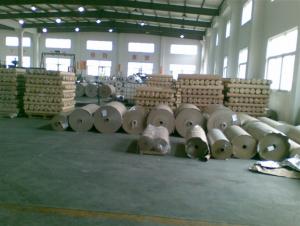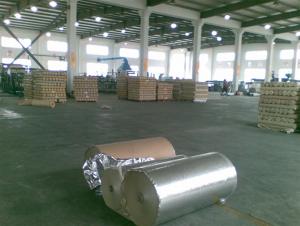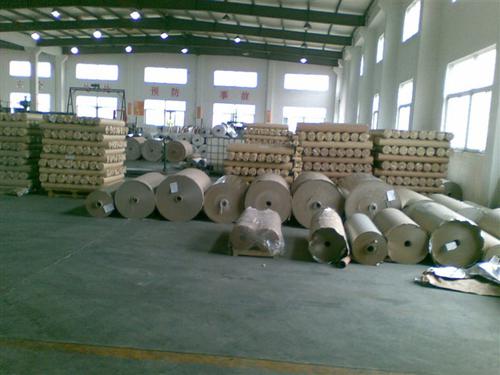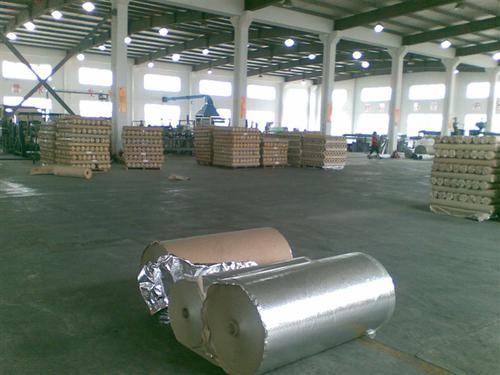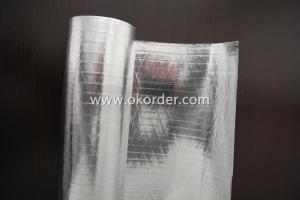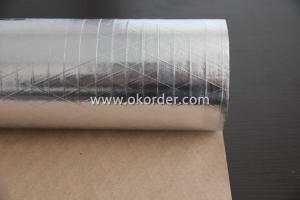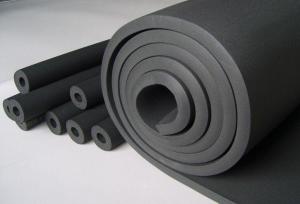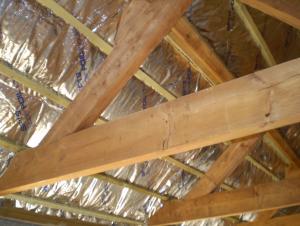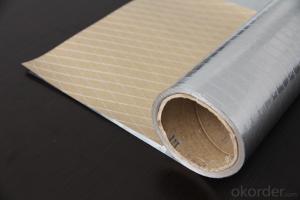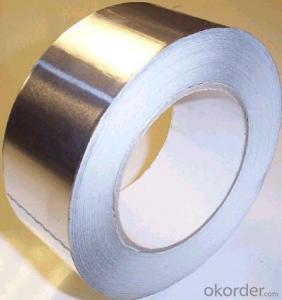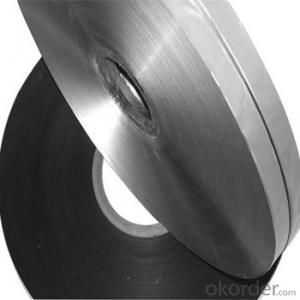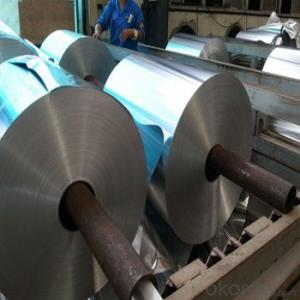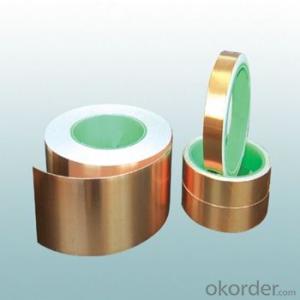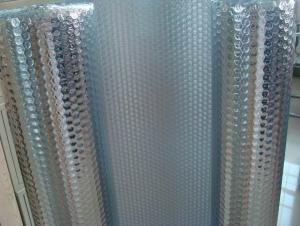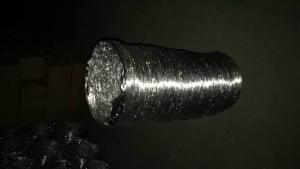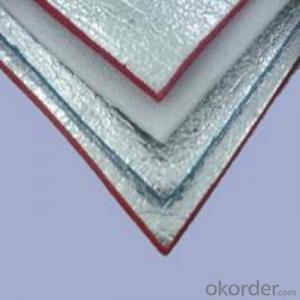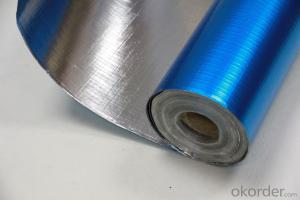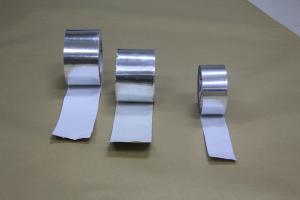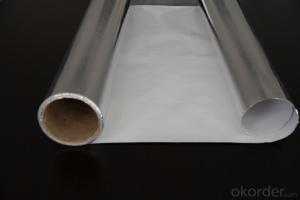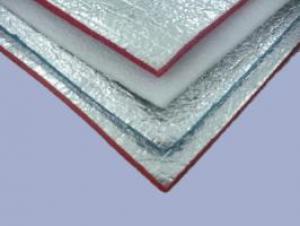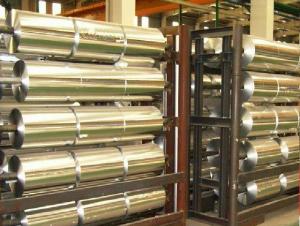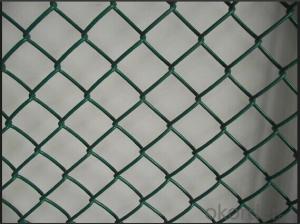Aluminum Foil Facing LDPE Bubble Foil Insulation
- Loading Port:
- Shanghai
- Payment Terms:
- TT OR LC
- Min Order Qty:
- 500 inch
- Supply Capability:
- 50000000 inch/month
OKorder Service Pledge
OKorder Financial Service
You Might Also Like
1. Aluminum Foil Facing Description:
The production technologies and products performance of aluminum foil facing have been up to international advanced level. The aluminum foil facing products are mainly used for HVAC system, refrigerators, building thermal aluminum foil facing insulation and laminated with glass wool and rock wool to increase the insulation function.
• FSK aluminum foil facing is mainly used for duct wrap in HVAC system and other fields, such as vapor barrier etc., and suitable for off-line lamination of glass wool or rock wool. By special processing, the facing will have excellent flame retardant property.
• Heat-sealing aluminum foil facing is used for duct wrap without applying extra adhesive and suitable for online lamination of glass wool and rock wool.
• The WPSK aluminum foil facing, whose structure is white polypropylene/ fiberglass scrim/ kraft is mainly used for metal building insulation and suitable for the insulation of ware-house, factory, supermarket, office and so on.
• Double sided aluminum foil facing vapor barrier, whose structure is aluminum foil/ high strength kraft /fiberglass scrim /aluminum foil and laminated together by special flame retardant adhesive, can be used for roofing, wall insulation of house, warehouse, cold storages, factory and others.
2.Main Features of the Aluminum foil facing:
• Light weight
• High manufacturing accuracy
• High strength
• Small inertia resistance
• Strong heat dissipation ability
• Good visual effect
• High reflective insulation
• Heat resistant, water proof, stable at high temperature;
• environmentally friendly,no smell and not-toxic;
• Smooth and clear surface;
3.Aluminum Foil Facing Images
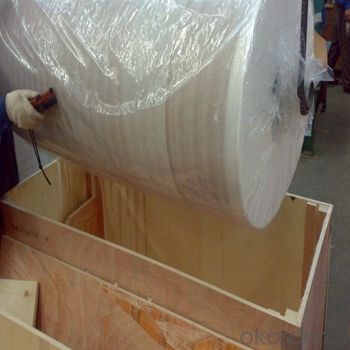
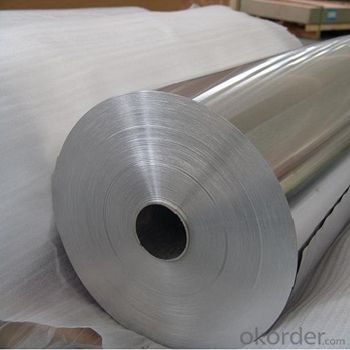
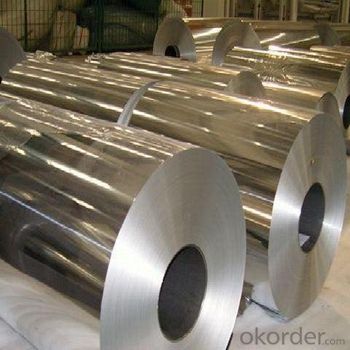
4.Aluminum Foil Facing Specification
TYPICAL PHYSICAL PROPERTIES:
Name:AL+LDPE | |||
Structure | Thickness(mic) | Weight(g/m2) | Yield(m2/kg) |
AL7+ LDPE12 | 21mic | 36 | |
AL7+ LDPE15 | 24 mic | 39 | |
AL9+ LDPE12 | 23mic | 43 | 23 |
AL9 +LDPE15 | 26mic | 48 | 21 |
AL9 +LDPE19 | 30mic | 54 | 19 |
AL9 +LDPE23 | 34mic | 60 | 17 |
AL12 +LDPE12 | 26mic | 52 | 19 |
AL12 +LDPE15 | 29mic | 56 | 18 |
AL12 +LDPE19 | 33mic | 62 | 16 |
AL12 +LDPE23 | 37mic | 67 | 15 |
AL12 +LDPE36 | 50mic | 87 | 12 |
AL15 +LDPE19 | 36mic | 70 | 14 |
AL25 +LDPE12 | 39mic | 87 | 12 |
AL25 +LDPE23 | 50mic | 102 | 10 |
AL40 +LDPE12 | 54mic | 127 | 8 |
AL40 +LDPE15 | 57mic | 131 | 8 |
AL40 +LDPE23 | 65mic | 143 | 7 |
AL40 +LDPE36 | 78mic | 161 | 6 |
AL50 +LDPE12 | 64mic | 154 | 6 |
PROPERTIES | UNIT | VALUE | TEST METHOD |
Basic weight | gsm | 80 | ASTM D646 |
Tensile strength: M. D. X. D. | N/25mm | 95 50 | ASTM C1136 |
Burst strength | N | 25 | ASTM D774 |
Reflectivity of foil surface | % | 95 | ---------- |
Temp. Resistance | -29°C +66°C | No change keep soft | ASTM C1263 |
Water vapor permeance | ng/N.s | 1.15 | ASTM E-96 |
Water Soak Test | 24hrs | No delamination | ---------- |
Width: 1.0m, 1.2m, 1.25 m, 1.30, 1.37m
Length: 200m, 500m, 1000m, 2500m, 2750m, 3300m
Core I.D.: 3"(76mm ±1), 72mm ±1
Based on order, special sizes are also available.
5.FAQ
We have organized several common questions for our clients,may help you sincerely:
(1) How about your company?
A world class manufacturer & supplier of aluminum foil facing and is one of the large-scale professional investment aluminum foil facing bases in China. Annually more than 1000 containers of aluminum foil facing are exported to markets in Europe, America and Japan.
(2)What is the storage condition?
The products should be stored at room temperature and kept from wet and heat source.
It is essential, as with all pressure-sensitive tapes, that the surface to which the tape is applied must be clean, dry, and free of grease and oil.
The user should take test and do trial-application on the above products before coming into application so as to witness and ensure suitability for user’s special purpose and technique.
(3) How to guarantee the quality of the products?
We have established the international advanced quality management system,every link from raw material to final product we have strict quality test;We resolutely put an end to unqualified products flowing into the market. At the same time, we will provide necessary follow-up service assurance.
(4) How long can we receive the product after purchase?
In the purchase of product within four working days, we will arrange the factory delivery as soon as possible. The specific time of receiving is related to the state and position of customers. Commonly 7 to 10 working days can be served
- Q: This question asks for instructions on how to store aluminum foil after it has been used.
- <p>To store aluminum foil facing after use, first, wash and dry it thoroughly to remove any residue. Roll it up tightly, starting from the end that has been used, to keep the cleanest part of the foil on the outside. You can also use a rubber band or a piece of tape to secure the roll. Store it in a cool, dry place, away from direct sunlight to prevent it from losing its shine and becoming brittle. If you have a dispenser, you can also reinsert the foil back into the dispenser for neat and organized storage.</p>
- Q: Is it possible to recycle aluminum foil with a facing material attached to it?
- <p>Yes, aluminum foil facing can be recycled. However, it's important to separate the aluminum foil from the facing material before recycling. The facing material, often plastic or paper, can contaminate the aluminum recycling process. Most recycling facilities accept clean aluminum foil, but it's best to check with your local recycling center for specific guidelines. Proper separation and cleaning of aluminum foil can ensure it is effectively recycled and contributes to reducing waste and conserving resources.</p>
- Q: How should aluminum foil be stored when not in use to maintain its facing orientation?
- <p>The best way to store aluminum foil is to keep it in its original box or a resealable container with the shiny side facing outward. This prevents the foil from sticking together and makes it easier to use. If the box is not available, you can also use a rubber band to wrap the foil around a cardboard tube, ensuring the shiny side is facing out, or place it in a container with a paper towel on the bottom to prevent sticking.</p>
- Q: This question asks for a comparison of the differences among different types of plastic containers.
- <p>Plastic containers vary in material composition, durability, temperature resistance, and intended use. HDPE (High-Density Polyethylene) is sturdy and good for detergent bottles and milk jugs. LDPE (Low-Density Polyethylene) is flexible and used for plastic bags and film. PET (Polyethylene Terephthalate) is recyclable and used for water bottles and food containers. PVC (Polyvinyl Chloride) is durable but not food-safe due to potential leaching of harmful chemicals. Polypropylene is resistant to heat and acids, making it suitable for microwave-safe containers. Polystyrene is lightweight and clear but not microwave-safe and can release styrene, a harmful chemical, when heated. Each type has specific uses and properties that make it suitable or unsuitable for certain applications.</p>
- Q: Explain the distinctions between aluminum foil facing and tin foil, including their composition and uses.
- <p>Aluminum foil facing and tin foil are both thin sheets of metal used for various purposes, but they differ in composition and properties. Aluminum foil facing is a thin layer of aluminum bonded to a substrate, often used in construction for insulation, while tin foil is pure tin and is used for wrapping food or as a decorative element. Aluminum foil is lightweight, corrosion-resistant, and conducts heat well, making it ideal for cooking and insulation. Tin foil, on the other hand, is less common in everyday use due to its higher cost and lower durability compared to aluminum. It is often used in niche applications such as art and craft projects or for certain types of food packaging that require a barrier to light and oxygen.</p>
- Q: This question asks for methods to utilize aluminum foil as a tool for preparing quick and easy meals.
- <p>Aluminum foil facing is a versatile tool for quick meal preparation. One method is the 'foil packet' technique, where you place ingredients like vegetables, protein, and seasonings in a foil pouch and bake or grill. This method helps retain moisture and flavor. Another way is to use foil as a makeshift baking tray for items like fish or potatoes, which can be seasoned and wrapped in foil for a one-step cleanup. Foil can also be used to cover food during grilling to prevent flare-ups or to steam vegetables. Always ensure food is cooked thoroughly and be cautious of potential aluminum leaching, especially with acidic foods.</p>
- Q: Is it possible to use aluminum foil with a non-stick coating as a substitute for non-stick baking or grilling pans?
- <p>Yes, aluminum foil facing can be used as a non-stick surface for baking pans or grilling pans. It provides a smooth, non-stick surface that prevents food from sticking and makes cleanup easier. However, it's important to ensure that the foil is heavy-duty and not too thin to avoid tearing during use. Additionally, while it can be a temporary solution, it's not as durable as a true non-stick surface and may require frequent replacement.</p>
- Q: This question asks for methods to clean stubborn food residue from the aluminum foil facing of a baking sheet or similar kitchen item.
- <p>To remove stuck-on food from aluminum foil facing, first let the surface cool down. Then, use a plastic scraper or an old credit card to gently lift the residue without scratching the foil. For stubborn stains, make a paste of baking soda and water, apply it to the area, and let it sit for a few minutes before scrubbing. Alternatively, use a mixture of vinegar and water to loosen the food particles. After cleaning, rinse thoroughly and dry to prevent further food adhesion.</p>
- Q: Is it possible to use aluminum foil with a reflective side facing up for cooking or frying food?
- <p>Using aluminum foil with a reflective side facing up for frying food is not recommended. Aluminum foil is not designed for direct contact with high heat sources like frying pans or oil. It can cause uneven heating, stick to the food, and potentially release harmful aluminum particles into the food. For safe and effective cooking, use appropriate cookware designed for high heat and direct contact with food.</p>
- Q: Is it possible to use aluminum foil facing in the creation of desserts?
- <p>Yes, aluminum foil facing can be used for making desserts, particularly for baking purposes. It is often used to line baking sheets or molds to prevent desserts from sticking, making them easier to remove after baking. It also helps in maintaining the shape and presentation of the dessert. However, it's important to ensure that the foil does not come into direct contact with the dessert if it's not oven-safe, as this could lead to contamination or uneven cooking. Always follow the manufacturer's guidelines for the specific type of aluminum foil you are using.</p>
Send your message to us
Aluminum Foil Facing LDPE Bubble Foil Insulation
- Loading Port:
- Shanghai
- Payment Terms:
- TT OR LC
- Min Order Qty:
- 500 inch
- Supply Capability:
- 50000000 inch/month
OKorder Service Pledge
OKorder Financial Service
Similar products
Hot products
Hot Searches
Related keywords
